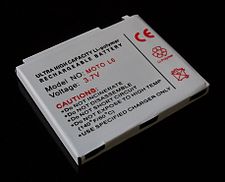Lithium-ion polymer battery

A lithium-ion polymer battery used to power a mobile phone
|
|
| Specific energy | 100–265 W·h/kg(0.36–0.95 MJ/kg) |
|---|---|
| Energy density | 250–730 W·h/L(0.90–2.63 MJ/L) |
| Nominal cell voltage | 3.3 V, 3.7 V, depending on chemistry |
A lithium polymer battery, or more correctly lithium-ion polymer battery (abbreviated variously as LiPo, LIP, Li-poly and others), is a rechargeable battery of lithium-ion technology in a pouch format. Unlike cylindrical and prismatic cells, LiPos come in a soft package or pouch, which makes them lighter but also less rigid.
The designation "lithium polymer" has caused confusion among battery users because it can be interpreted in two ways. Originally, "lithium polymer" represented a developing technology using a polymer electrolyte instead of the more common liquid electrolyte. The result is a "plastic" cell, which theoretically could be thin, flexible, and manufactured in different shapes, without risk of electrolyte leakage. The technology has not been fully developed and commercialized and research is ongoing.
The second meaning appeared after some manufacturers applied the "polymer" designation to lithium-ion cells contained in a non-rigid pouch format. This is currently the most popular use, in which "polymer" refers more to a "polymer casing" (that is, the soft, external container) rather than a "polymer electrolyte". While the design is usually flat, and lightweight, it is not truly a polymer cell, since the electrolyte is still in liquid form, although it may be "plasticized" or "gelled" through a polymer additive. These cells are sometimes designated as "LiPo"; however, from a technological point of view, they are the same as the ones marketed simply as "Li-ion", since the underlying electrochemistry is the same.
This article concerns the second, more extended meaning (among the general public), while the first meaning (understood in research and academia) is discussed only in the last section.
The name "lithium polymer" (LiPo) is widespread among users of radio-controlled models, for which it may indicate a single cell or a battery pack with cells connected in series or parallel. The more general term "lithium-ion" (Li-ion) is used almost everywhere else, including consumer electronics such as mobile phones and notebook computers, and battery-powered electric vehicles.
...
Wikipedia
